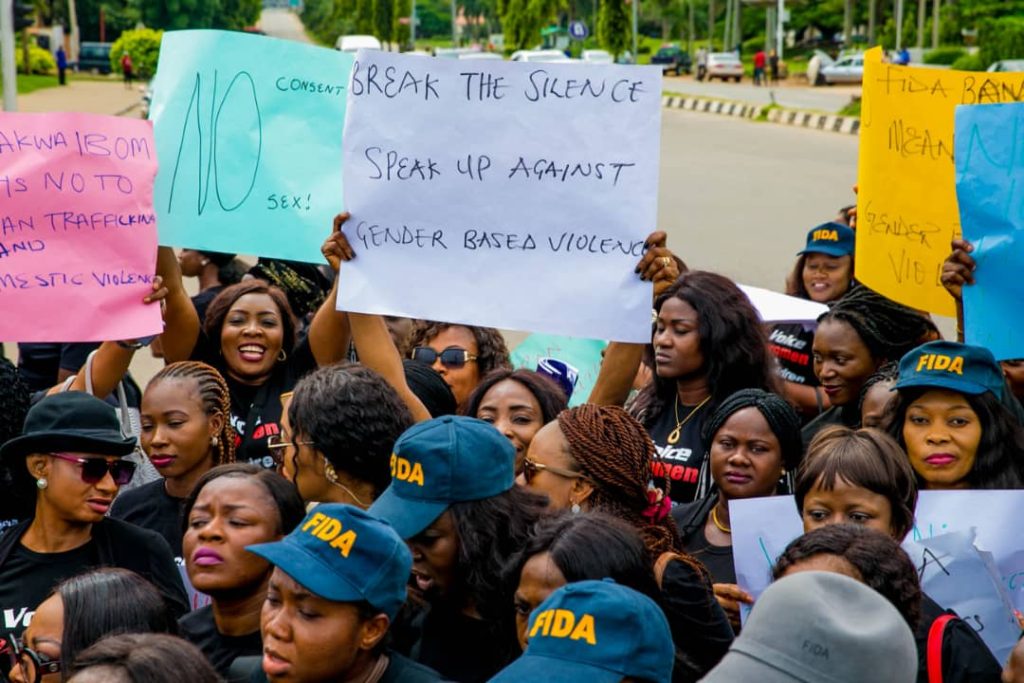- Says FIDA must tap into the strength and energy of its young members
- Calls for collaboration with sister organizations and service providers
- We can achieve more wins if we change our methodology… Cyber activism has taken over
- There is a subtle form of discrimination on-going and rights of women practitioners are continually abused
“With the coming of ICT and the dynamics in society the concept of human rights as well as women’s right keeps evolving and FIDA must measure up with the times to continue being relevant.” – Chimdindu Onyedim-Etuwewe
She does not cut the picture of your regular rights advocate. Her calm, school girl like mien gives an impression of a taciturn, laid back young lady. But the courage and energy buried deep inside this petite female lawyer is startling.
Her words rattled the virtual audience of over 300 female lawyers from around the world, at the just concluded 37th triennial Convention of the International Federation of Women Lawyers (FIDA).
“You cannot remain relevant today with yesterday’s methods and be in business tomorrow,” she announced during her presentation at the Showcase Session titled – The future of women’s rights protection.
Chimdindu Onyedim-Etuwewe, addressed mostly as Chimdy was called to the Nigerian Bar in 2013. An ardent advocate, she has appeared before various superior courts of record in Nigeria and has considerable knowledge and experience in the area of Litigation and Corporate practice.

Described as a consistent, persistent and reliable lawyer, her strong passion for law and analytical skills stands her out when dealing with legal issues. Alongside her profession, she recognises the value of giving back to the society and passionately seeks avenues to protect the rights of women, children and the vulnerable in the society.
In her four-part paper – Protection of women’s rights, Protection of women’s rights: the future vision, Women’s rights protection in the age of ICT, 76 years after…Is FIDA relevant for the future? Chimdy stressed the pressing need for women’s movements like FIDA to evaluate their methods, with a view to making their future work more effectively.
“FIDA must adopt the physician heal thyself approach,” she charged, while emphasising that: “The objective to protect the rights of women will continue to be irrelevant if women lawyers do not examine the ills of patriarchy rife in the profession.”
Continuing, she observed that: “In Nigeria for instance, women lawyers stand lesser chances of getting juicy legal jobs by reason of their gender. Women are still addressed as men and statements like ‘there are no men in the legal profession’ and ‘gentlemen in skirts’ are prevalent.
“There is a subtle form of discrimination on-going and the rights of women practitioners are continually abused. Until FIDA looks inward to protect its local constituency (female lawyers) it will lose steam to confront the monster outside.
“This also makes the organization less attractive to the majority of female practitioners who are battling these ills of patriarchy in the profession but do not see a saviour in FIDA. Our impact as women’s rights advocates will increase when our membership increases.”
Chimdy further pointed out that: “With the coming of ICT and the dynamics in society the concept of human rights as well as women’s right keeps evolving and FIDA must measure up with the times to continue being relevant.
“For instance, with technological advancement comes a new crime of revenge porn/blackmail via social media constantly used as a tool to abuse women. This is a great shift from the traditional abuses FIDA is accustomed to fight against and we must deploy new measures to tackle same.
“We now see the power of social media campaigns in changing attitudes and raising awareness. By properly utilizing social media and amplifying the voices of others who do, FIDA can make a difference.”

“Before now”, she continued, “the culture of silence dominated our society; women felt enslaved and alone. The threat of backlash held women down, but with more awareness and social media, the culture of silence is being broken and women are gradually speaking out (whether anonymously or in person). There are now several online communities offering help, psycho social support is now available.
“The case of a medical doctor in Nigeria readily comes to mind to buttress the point. As a victim of domestic violence, she was able to cry for help on social media and the number of persons/ organizations who all offered to help seek justice for her and support her is admirable even though I do not know if the real help she requires was what she got. But it goes to show that the culture of silence is gradually phasing out and people are finding their voices which are amplified via social media…
“We must ensure that we have a fit-for-purpose women’s rights protection organisation that not only meets the needs of all her members – young, middle-aged and senior; but also meets the needs of our critical stakeholders – women and children, as we seek to ensure the sustainability of the dream of our founding mothers, 76 years after…
“Important gaps in the protection of women’s rights still exist as women’s realities are constantly changing, with new manifestations of discrimination against them regularly emerging…These intersecting forms of discrimination and the dynamics of society must be taken into account when developing measures and responses to combat discrimination against women.
“Women and girls continue to be undervalued socially, economically, culturally and politically while experiencing various forms of violence at home and in public spaces. Furthermore, there is a significant threat of rollback of hard-won feminist gains. While women rights are being recognized, the protection of same through enforcement has been generally poor.
“The Future of Women’s Rights identifies the emergence of various trends threatening the advancement of gender equality, women’s rights and sustainable human development.
“These phenomena include the impacts of globalization and neoliberal economics, developments in biotechnology, the neoconservative backlash against women’s rights, monopolistic ownership patterns over information technologies, the rise of identity politics marginalizing women’s issues, and the increase in violent conflict and war.
“There is a pressing need for women’s movements like FIDA to evaluate their methods, with a view to making their future work more effective.”
The rights advocate who expressed concern over the low percentage of young female lawyers in FIDA made the following recommendations:
- Youth is creative, flexible and has the ability to organize and promote new things, so it is important to absorb the younger female lawyers in its membership, strategic offices and present a renewed drive against women’s right abuses.
- FIDA must tap into the strength and energy of its young members.
From the Nigerian perspective and my experience as a young member, FIDA as it currently is, is no longer fashionable to the average female young lawyer. This is as a result of various factors and an over reliance on age/seniority at the bar than on competence/capacity irrespective of age.
This has led these young female professionals who are passionate about women’s rights to either discard the passion or invest it in some other youth friendly organization. While this is not a battle of old women vs. young women, the overall goal being increased protection of women’s rights, it is recommended that FIDA adopts a balanced membership across all age groups.
The knowledge of an historical women’s rights activist and the knowledge of young women involved in cyber activism are different and have to complement each other. While the younger women master the technology, the older women dominate the knowledge and there must be an exchange of know-how between these groups.
This geniality needs to be mixed, shared and mutually respected while ensuring seamless transition of knowledge and ideals to coming generations of women lawyers. Catch them young schemes can be deployed towards increasing our membership by introducing FIDA clubs in the University/Law school. This waters the appetites of fresh lawyers to join FIDA.
Thereafter FIDA must ensure membership retention by ensuring that these ladies are assigned mentors, involved in specialized committees and leadership positions as they grow in the movement. As the popular saying goes, the more female lawyers we have in FIDA, the merrier for us and women’s rights worldwide.
- A change of methodology by FIDA- Effective use of Information Technology:
While advocacy has been a major tool for FIDA and considerable progress has been made, it is not yet uhuru for women’s rights globally. One notable progress is that the culture of silence is gradually being eroded and women are finding their voices.
However we can achieve more wins if we change our methodology. I have noted that FIDA operations especially in Nigeria, are largely analogue, in a time when social media has taken over human interactions. Cyber activism has taken over and ensures mass awareness and enforcement of women’s rights.

With advancement in technology various rights groups and communities are springing up online and this has put their names on the lips of many worldwide. FIDA must not be left behind. A quick glance through Google shows that FIDA has not done well with social media.
When you run a quick search on women’s rights organisations globally, FIDA does not appear among the first 25 neither does its name pop up. Our inability to tap into social media is responsible for this. It is shocking that after 76 years of actively working to protect women’s rights our visibility in theage of ICT is poor when placed side by side with new entrants to the movement.
Concluding, Chimdy Onyedim-Etuwewe made additional recommendations. “While I commend FIDA for its efforts and wins thus far which has led to the recognition and enactment of laws to protect women’s rights, FIDA must step up its social media advocacy.
“Newer organisations are on the list and this is simply because they are able to tap into the power of social media. Cyber activism goes beyond mere posting of pictures and fliers online as it includes deploying monitoring and reporting tools like web/mobile apps to encourage timely reports of abuses and mobile help desks to offer round the clock services to victims of abuse.
“For example, certain women rights protection groups that have sprung up on social media, no longer wait for complaints by victims, as they go looking for victims of abuses via their posts.
“I belong to one and can categorically state that the impact of this tool has increased awareness and compliance as these groups ensure abuse issues are sorted via social media, and ensure enforcement as security agencies are more known to act faster when the heat from the news is on them. FIDA must become a household name and a readily available guardian of women’s rights on social media.
“Synergy and collaboration with sister organizations & service providers: Collaboration is the new path to relevance and FIDA must not be found wanting in this regard. We need to identify the needs of women asides access to justice, like mental health, access to reproductive services, amongst others and find similar organisations with such objectives. By doing that we are able to reach more women and girls and ensure the protection of their rights. This also leads to more referral and more satisfaction for stakeholders.

“I always say a woman alone has power but collectively we have greater power and impact. The power of the pack comes to play in achieving greater protection of women’s rights when we collaborate with other women’s rights movement. Because of the complexity of women rights issues, we need to form partnerships with other organisations with similar objectives to provide meaningful impact and acknowledge that we can’t tackle these issues alone.
“We must also collaborate and forge partnerships with mechanisms of state like security agencies and other bodies with similar goals. If we have independently achieved this level of progress running alone, we can achieve more with partners.
“Partnerships of the future will reflect amongst other things virtual-based networks and hubs, short-term, mission-focused networks and more functionally linked partners, e.g. cities-to-cities, cross-border communities. The challenge for FIDA will be how best to bring such partnerships into forums that will support and promote their objectives.
“In closing, I must end with the quote; you cannot remain relevant today with yesterday’s methods and be in business tomorrow. FIDA will remain relevant in the movement to protect women’s rights only if it adapts faster to the times and innovates as soon as possible.”

